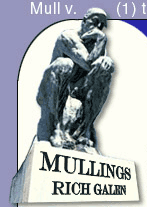

Let's Get it On!
Monday December 31, 2007
Click here for an Easy Print Version
From Ames, Webster City, Hampton,
and Charles City,
Iowa
For political junkies there is nothing like an even-numbered year because it signals campaigns for US House and Senate, Governors, State Legislators, and everything down to Mayors and City Council members.
When the even-numbered year is evenly divisible by four - as in 2008 - you get to add a campaign for President of the United States.
Unless you have been living in a yurt in a suburb of Ulaanbaatar, Mongolia for the past year, you know that Thursday night the Presidential selection process will kick off with the Iowa caucuses.
We have all become at least conversant with, if not experts in, the Iowa caucus process, but it is still useful to review how the process works on election day next November 4.
As you know, the President is not elected directly by popular vote. When you vote next November you will be voting for someone who is a supporter of, or pledged to, one of the candidates.
According to Article II, Section 1 of the US Constitution:
Each State shall appoint, in such Manner as the Legislature thereof may direct, a Number of Electors, equal to the whole Number of Senators and Representatives to which the State may be entitled in the Congress.
Thus, the fewest number of electoral votes a State can have is three: Each State has two Senators regardless of its size. Congressional districts are apportioned by population. One Member of Congress represents each of the States with the smallest populations (Alaska, Delaware, Montana, North Dakota, South Dakota, Vermont and Wyoming) all the way up to 55 for the most populous State, California.
Notwithstanding Amendments 12, 20 and 25, this is pretty much - to use a phrase made popular by Nobel Prize Laureate and probable felon, Al Gore - the controlling legal authority.
SIDEBAR
Interestingly, there is nothing in that clause which calls for a specific election day, or for an election at all. "[S]uch manner as the legislature may direct" means just that. A state, by law, could empower the members of the State House and Senate to appoint electors or, one assumes, a state could construct a lottery - one vote for each dollar donated to the state general fund by a candidate - most money wins.
Could happen.
END SIDEBAR
Under our current system people vote, electors are chosen, they meet on a date determined by Congress. They send their choices for President and Vice-President to Washington, DC in envelopes which are opened and counted by the President of the Senate (usually the sitting Vice-President of the United States) and, according to the Constitution:
"[T]he person having the greatest number of votes for President, shall be the President, if such number be a majority of the whole number of electors appointed.
There are currently 435 Members of the House and 100 Senators, so you might think a candidate needs a majority of 535 votes - 268 - to be elected. However, the District of Columbia has the same number of electors as the smallest State - three - thus 270 votes are needed to gain a clear majority.
If no candidate receives a majority - which can only happen if a third party candidate actually wins some electoral votes - then the election (after some Constitutional and parliamentary zigs and zags) goes to the House of Representatives where, according to the Clerk of the House webpage "each State delegation casts one vote [same for Wyoming as for California] for one of the top three contenders to determine a winner."
This has only happened twice, in 1824 (John Quincy Adams v. Andrew Jackson) and in 1876 (Rutherford B. Hayes v. Samuel J. Tilden).
I raise this possibility because of the chatter which rose again yesterday that �ber-Billionaire (and New York Mayor) Michael Bloomberg is beginning to rattle the chains of a third party candidacy.
Unless he wins 270 electoral votes, the election will go to the US House where the Democrats will probably control of the majority of State delegations thus ensuring Michael Bloomberg will not be the next President of the United States.
See what I mean about even numbered years divisible by four?
Happy New Year!
On the Secret Decoder Ring page today: Lots o' stuff. Links to Yurts, Mongolia, and the two elections decided by the US House. Also a Mullfoto clearly showing why it is better to be the President than Vice-President and a Catchy Caption of the Day.
--END --
Copyright © 2007 Barrington Worldwide, LLC
Become a
Paid Mullings Subscriber!
(To join the FREE mailing list or to unsubscribe Click Here)

Current Issue |
Secret Decoder
Ring | Past
Issues | Email
Rich | Rich
Who?
Copyright �2006 Richard
A. Galen | Site design by Campaign
Solutions. |





 US & Int'l Papers
US & Int'l Papers